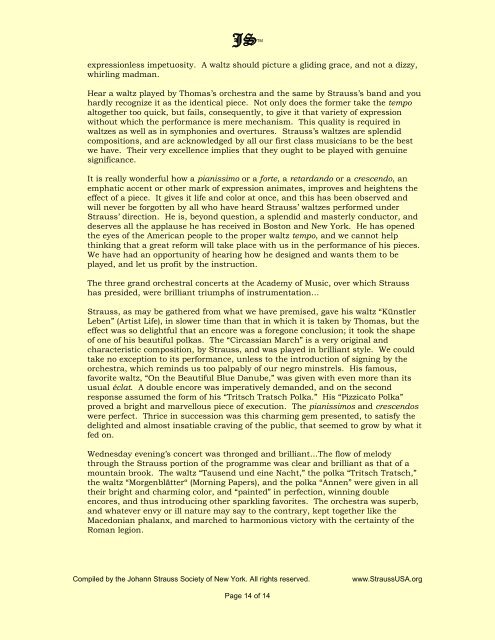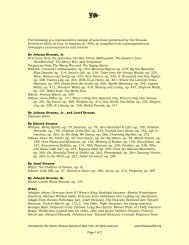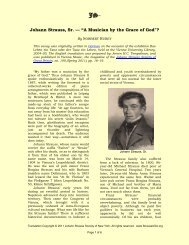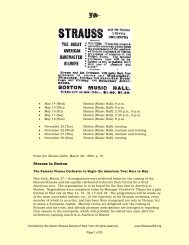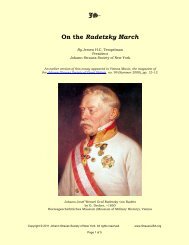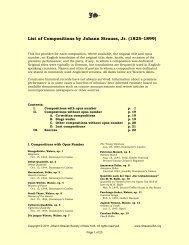here - Johann Strauss Society of New York
here - Johann Strauss Society of New York
here - Johann Strauss Society of New York
You also want an ePaper? Increase the reach of your titles
YUMPU automatically turns print PDFs into web optimized ePapers that Google loves.
JS TM<br />
expressionless impetuosity. A waltz should picture a gliding grace, and not a dizzy,<br />
whirling madman.<br />
Hear a waltz played by Thomas’s orchestra and the same by <strong>Strauss</strong>’s band and you<br />
hardly recognize it as the identical piece. Not only does the former take the tempo<br />
altogether too quick, but fails, consequently, to give it that variety <strong>of</strong> expression<br />
without which the performance is mere mechanism. This quality is required in<br />
waltzes as well as in symphonies and overtures. <strong>Strauss</strong>’s waltzes are splendid<br />
compositions, and are acknowledged by all our first class musicians to be the best<br />
we have. Their very excellence implies that they ought to be played with genuine<br />
significance.<br />
It is really wonderful how a pianissimo or a forte, a retardando or a crescendo, an<br />
emphatic accent or other mark <strong>of</strong> expression animates, improves and heightens the<br />
effect <strong>of</strong> a piece. It gives it life and color at once, and this has been observed and<br />
will never be forgotten by all who have heard <strong>Strauss</strong>’ waltzes performed under<br />
<strong>Strauss</strong>’ direction. He is, beyond question, a splendid and masterly conductor, and<br />
deserves all the applause he has received in Boston and <strong>New</strong> <strong>York</strong>. He has opened<br />
the eyes <strong>of</strong> the American people to the proper waltz tempo, and we cannot help<br />
thinking that a great reform will take place with us in the performance <strong>of</strong> his pieces.<br />
We have had an opportunity <strong>of</strong> hearing how he designed and wants them to be<br />
played, and let us pr<strong>of</strong>it by the instruction.<br />
The three grand orchestral concerts at the Academy <strong>of</strong> Music, over which <strong>Strauss</strong><br />
has presided, were brilliant triumphs <strong>of</strong> instrumentation…<br />
<strong>Strauss</strong>, as may be gat<strong>here</strong>d from what we have premised, gave his waltz “Künstler<br />
Leben” (Artist Life), in slower time than that in which it is taken by Thomas, but the<br />
effect was so delightful that an encore was a foregone conclusion; it took the shape<br />
<strong>of</strong> one <strong>of</strong> his beautiful polkas. The “Circassian March” is a very original and<br />
characteristic composition, by <strong>Strauss</strong>, and was played in brilliant style. We could<br />
take no exception to its performance, unless to the introduction <strong>of</strong> signing by the<br />
orchestra, which reminds us too palpably <strong>of</strong> our negro minstrels. His famous,<br />
favorite waltz, “On the Beautiful Blue Danube,” was given with even more than its<br />
usual éclat. A double encore was imperatively demanded, and on the second<br />
response assumed the form <strong>of</strong> his “Tritsch Tratsch Polka.” His “Pizzicato Polka”<br />
proved a bright and marvellous piece <strong>of</strong> execution. The pianissimos and crescendos<br />
were perfect. Thrice in succession was this charming gem presented, to satisfy the<br />
delighted and almost insatiable craving <strong>of</strong> the public, that seemed to grow by what it<br />
fed on.<br />
Wednesday evening’s concert was thronged and brilliant…The flow <strong>of</strong> melody<br />
through the <strong>Strauss</strong> portion <strong>of</strong> the programme was clear and brilliant as that <strong>of</strong> a<br />
mountain brook. The waltz “Tausend und eine Nacht,” the polka “Tritsch Tratsch,”<br />
the waltz “Morgenblätter“ (Morning Papers), and the polka “Annen” were given in all<br />
their bright and charming color, and “painted” in perfection, winning double<br />
encores, and thus introducing other sparkling favorites. The orchestra was superb,<br />
and whatever envy or ill nature may say to the contrary, kept together like the<br />
Macedonian phalanx, and marched to harmonious victory with the certainty <strong>of</strong> the<br />
Roman legion.<br />
Compiled by the <strong>Johann</strong> <strong>Strauss</strong> <strong>Society</strong> <strong>of</strong> <strong>New</strong> <strong>York</strong>. All rights reserved.<br />
www.<strong>Strauss</strong>USA.org<br />
Page 14 <strong>of</strong> 14


